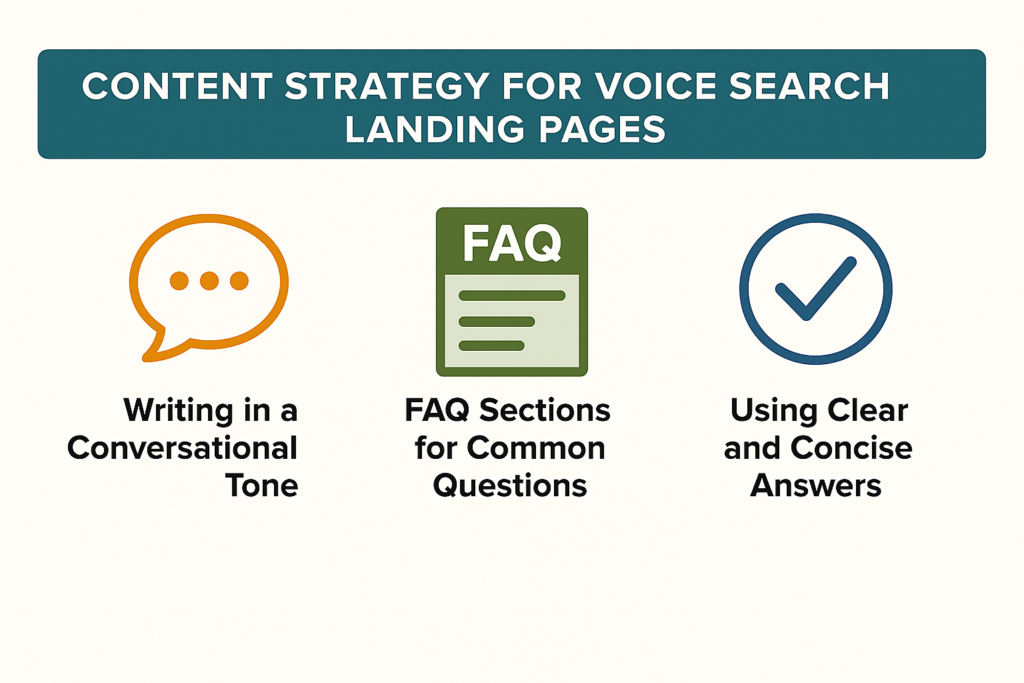
How to Structure SEO Landing Pages for Voice Search
Learn how to structure SEO landing pages for voice search to boost visibility, capture conversational queries, and drive more qualified leads.
Table of Contents
Introduction
Voice search isn’t the future—it’s the present. With virtual assistants like Alexa, Siri, and Google Assistant becoming everyday companions, voice search is transforming the way people find information online. If your landing pages aren’t structured for voice queries, you’re missing out on a massive pool of potential leads.
Rise of Voice Search Technology
From smartphones to smart speakers, voice-enabled devices are everywhere. People love them because speaking is faster and easier than typing.
Why Voice Search is Changing SEO
Unlike typed searches, voice searches are longer, more conversational, and often question-based. This means your SEO landing pages need to mirror how people naturally speak.
Benefits of Optimizing for Voice Search
When you optimize for voice search, you’re not just future-proofing your SEO—you’re improving usability, capturing more local searches, and increasing conversions.
Understanding Voice Search Behavior
Conversational Queries
Instead of typing “best coffee shops,” people ask, “What are the best coffee shops near me?” This natural language pattern defines voice search.
Long-Tail Keywords and Natural Language
Optimizing for long-tail keywords helps align your content with real user intent. Think phrases, not just keywords.
Local Intent in Voice Searches
Almost 50% of voice searches are local. This means businesses must focus on location-specific landing page optimization.
Key Elements of Voice Search-Friendly Landing Pages
Page Speed and Mobile Friendliness
Slow pages kill voice search rankings. A landing page that loads quickly and is optimized for mobile devices guarantees increased visibility.
Structured Data and Schema Markup
Schema markup tells search engines what your content means, improving your chances of appearing in voice search answers.
Featured Snippets and Position Zero
Most voice search results come from featured snippets. Structuring content with clear, concise answers can land you in position zero.
Content Strategy for Voice Search Landing Pages
Writing in a Conversational Tone
Your content should sound like natural speech. Write like you’re answering a question in real time.
FAQ Sections for Common Questions
FAQs mimic voice queries perfectly. They’re concise, direct, and match user intent.
Using Clear and Concise Answers
Responding succinctly and directly increases the likelihood that voice assistants will pick you up.
Technical SEO Considerations
Mobile-First Indexing
Google prioritizes mobile-first indexing, so your landing page must look flawless on smartphones.
HTTPS and Security
Secure websites rank better and build user trust, essential for conversions.
Optimizing Core Web Vitals
Metrics like LCP, FID, and CLS influence both user experience and rankings.
Local SEO and Voice Search
Google Business Profile Optimization
Keeping your Google Business Profile updated boosts local visibility in voice search.
Location-Based Keywords
Include city names, “near me,” and geo-specific terms in your landing page content.
Voice Search for “Near Me” Queries
Capturing high-intent local leads is facilitated by optimizing for “near me” searches.
Structuring the Landing Page Layout
Clear Headings and Subheadings
Using H1, H2, and H3 tags to organize content facilitates indexing and scanning.
Visual Hierarchy for Easy Scanning
Use whitespace, bullet points, and bold text to guide readers quickly.
Strong Call-to-Actions (CTAs)
Don’t leave visitors guessing—use strong CTAs like “Call Now” or “Get a Free Quote.”
Common Mistakes to Avoid
Overstuffing Keywords
Voice search requires natural flow. Stuffing “near me” keywords everywhere looks spammy.
Ignoring Mobile Usability
Most voice users won’t notice you if your website isn’t responsive.
Neglecting Schema Implementation
Without schema, search engines can’t fully understand your landing page.
Tools to Optimize for Voice Search
Google Search Console and Analytics
Track queries and see how voice users are finding your site.
SEMrush and Ahrefs
Find long-tail, question-based keywords for optimization.
AnswerThePublic for Question-Based Keywords
Discover real voice-style queries people ask online.
Future Trends in Voice Search SEO
AI Assistants and Smart Devices
With AI getting smarter, expect even more personalized search results.
Multilingual Voice Search
Optimizing for multiple languages will be essential for global reach.
Personalized Search Experiences
AI will tailor search results based on user behavior, making personalization critical.
Conclusion
Voice search is rewriting the rules of SEO. To thrive, your landing pages must embrace conversational content, structured data, fast speeds, and mobile-first design. By aligning SEO with how people actually speak, you’ll stay ahead in the lead generation game.
Frequently Asked Questions
Voice search changes keyword strategies, emphasizing long-tail, natural, and question-based queries.
Concise, conversational, and FAQ-style content works best.
Yes, schema helps search engines understand your content and improves chances of ranking in voice answers.
Extremely important—slow sites rarely rank in voice search results.
Absolutely. Voice search often includes local intent, making it a powerful tool for local businesses.
Table of Contents
Popular Posts
-
 Affordable Technical SEO Audit for Small Business: A Complete Guide26 Jun 2025 Blog
Affordable Technical SEO Audit for Small Business: A Complete Guide26 Jun 2025 Blog -
 How to Get an Affordable Technical SEO Audit for Small Business27 Jun 2025 Blog
How to Get an Affordable Technical SEO Audit for Small Business27 Jun 2025 Blog -
 The Ultimate Local SEO Audit Checklist for Startups28 Jun 2025 Blog
The Ultimate Local SEO Audit Checklist for Startups28 Jun 2025 Blog -
 Local SEO Audit Checklist for Startups: A Beginner’s Guide28 Jun 2025 Blog
Local SEO Audit Checklist for Startups: A Beginner’s Guide28 Jun 2025 Blog -
 Top On-Page SEO Audit Steps for Service Websites Every Business Should Know29 Jun 2025 Blog
Top On-Page SEO Audit Steps for Service Websites Every Business Should Know29 Jun 2025 Blog -
 Technical SEO for WordPress: The Ultimate Beginner’s Guide01 Jul 2025 Blog
Technical SEO for WordPress: The Ultimate Beginner’s Guide01 Jul 2025 Blog -
 The Impact of On-Page SEO Audit Steps for Service Websites on UX01 Jul 2025 Blog
The Impact of On-Page SEO Audit Steps for Service Websites on UX01 Jul 2025 Blog -
 Technical Mobile SEO Audit Tips for Developers02 Jul 2025 Blog
Technical Mobile SEO Audit Tips for Developers02 Jul 2025 Blog -
 Complete SEO Backlink Audit Guide for Better Google Rankings03 Jul 2025 Blog
Complete SEO Backlink Audit Guide for Better Google Rankings03 Jul 2025 Blog -
 Boost Your Rankings with Technical SEO for WordPress01 Jul 2025 Blog
Boost Your Rankings with Technical SEO for WordPress01 Jul 2025 Blog







